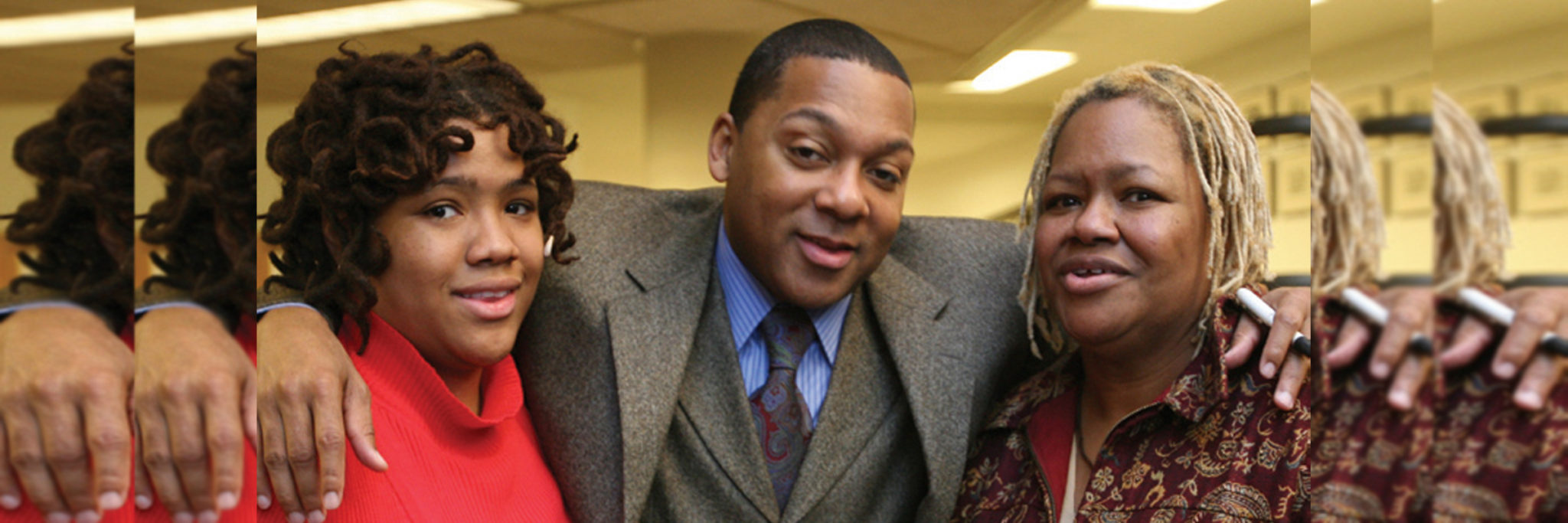Sydney and Sheree Camel live in the Uptown Broadmoor section of New Orleans. Sydney arrived for her first semester at Denison just days after burying her grandmother. And just days later, Hurricane Katrina sent her world into yet another spin. She lost contact with Sheree, who survived the five days after the storm on a highway bridge and in the New Orleans Convention Center. They were reunited the following week when Sheree arrived in Ohio. She stayed in an apartment in nearby Newark for much of the academic year before returning to New Orleans to begin rebuilding their life there.
Sydney: The hurricane hit Monday morning. I was in calculus when my phone rang. Later, I listened to the voice mail and my mom said she was leaving our house. We had just had a large drainage project done in this neighborhood that was supposed to protect it from everything…everything. But it was flooding fast. She’d call later that evening. But then the phones went out. I didn’t hear from her for almost a week.
Sheree: I ended up standing on Interstate 10, with hundreds and then thousands of other people. Later I learned that every part of I-10, every neighborhood and every bridge was the same. My uncle was there, too, but I didn’t know it then. I was alone in this. The Superdome was full. We were hearing that busses would pick us up, but they never came. No one came. On the third day we were forced off the bridge. We were told we either had to walk across the bridge into a different parish or we would have to go to the convention center, which was the first exit off the bridge. When people tried to cross, they were turned back and shots were fired over their heads. People over there were shouting, “We don’t want any of these ‘N’s’ in our parish!” Now of course we weren’t all the dumbest of the dumb, the poorest of the poor like the media depicted. We were just those poor, dumb people who got left in the water. By that time, I could barely walk and ended up with the very last of those to come off the bridge. The convention center was full of people and we had the nursing home populations, too—they had just been left there. Nobody to care for them, no FEMA, no first responders, nothing—just the people left there to take care of the people.
Sydney: Finally, at about 3 a.m. on Friday, my mom called. They were building a fence around the convention center and saying the busses were coming, but they weren’t coming. There was no food, no water. She asked me to call everybody I know and let them know what was going on. I called my uncle in California and I tried to call the radio station in New Orleans, the only one that was broadcasting. I watched TV, seeing the thousands of people there, two dead bodies; there were more than two, but just those two over and over again. I was crying all the time. Sunday afternoon, I got a call that my mom was at the LSU sports center that they’d turned into a hospital. They were running tests on her because they thought she had a heart attack. A nurse called on Labor Day to let me know my mom was coming up here. The next day she flew to Columbus.
Sheree: What happened that caused 100,000 people to be evacuated from the city, people to be living across America right now, people to be disenfranchised, unable even now to vote, people having property issues they’ve never had to deal with? For most African American people, their homes are their only assets. We don’t associate this tragedy with the hurricane. This isn’t about the hurricane.
Sydney: It’s been a hard year. I received a lot of support from my friends and everyone on campus. Denison helped my mom find a hotel. She spent two months there and later found an apartment.
Sheree: Everybody’s worried about the new hurricane season, but you have to pick your worry. New Orleans is our home. Sydney and I feel about our home the way everyone around the world feels about their home. This is where we live. We have always had hurricanes.
Sydney: My mom and I went to New Orleans with about 20 students over spring break to help wherever we could. I had been back twice before. It looked better each time, something new was there, something old was back, some people were back. We have two houses, one we rented where we lived and the family-owned home of our elders. There was damage to the roof and siding, the walls upstairs. The downstairs is completely gone, gutted.
Sheree: The future remains to be seen. But the future that was planned right after the hurricane—“the new tourist Mecca,” they called it—that’s not going to happen without a fight. People aren’t willing to give up their lives and their property for this. Even our neighborhood was being considered for green space. The people will have a voice. Whether things get better after the mayoral elections remains to be seen.
Sheree: What we are going through is beyond surreal. People could maybe understand the lack of supplies, unethical insurance companies, price gouging—you can kind of understand that a little bit more than living in this twilight zone we’re in now. I’m writing a book about my experiences to help me reconcile what I saw, what I heard—to document it all. It’s so unbelievable. I’m hopeful the city will once again be what it was, but in a sense I know it will never be

